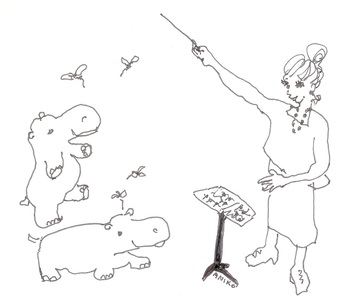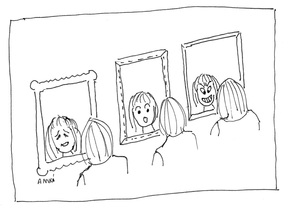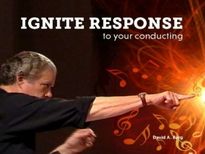
Here's how to get us playing/singing with expression, dynamics, and enthusiasm
- If a piece has a history or a story, share it. If not, invite students to create their own stories or characters for each passage.
- Show your class Walt Disney's Fantasia - either one - to help them think about music as "life in sound."
- Use the expression that you want in your conducting. We can only know how you want the music to sound if you put just as much expression, "dynamics", and enthusiasm into your conducting.
- Help us see the music in a new light and bring us out of our comfort zones in order to achieve the musicality necessary. Something that helps me play a piece with enthusiasm is listening with a new ear every I practice it. I try to find something I haven't heard or interpreted before. I've realized that the good old saying "if you can sing it, you can play it" really is true! It's a fun little break and exercise for our otherwise silent voices. And also, back to the hand motions. If it's big, I look for big gestures from the podium. Same goes for quiet sections!
- Teach students to listen carefully - repeat sections until they are the correct sound. Don't let them settle for anything less that what they are capable of - an orchestra that works hard has greater reward in the concert.
- Take it to the extreme, ask us to do it so over the top. Then, it's either just right or too much. Dialing it down is easier.
- By conducting and leading us with enthusiasm, and giving us praise when we play a passage correctly.
- Attaching a story, joke, or emotion to a section will help play with more expression.
- The more emotion you show, the more you'll get back. The best conductors (Bernstein, Muti, Barenboim, etc) get the most out of their orchestras by showing their hearts in their conducting. A terrific example on YouTube is Alan Gilbert doing Mahler 2 with the NY Philharmonic. Very end of the finale, look at his emotion, and listen to the response of the orchestra.
- When you have insight to the piece, or have a game plan for what you want to express, let the musicians notice. We don't want to be bland.

- The conductor has to look like the music sounds. The conductor needs to look like what he wants the music to sound like and that energy will translate into our playing.Again lead by example. You show us your into the music we will be into it. Help us to get into the music.
- I like when the conductor makes dynamics clear using their hands and posture and facial expression.
- Swear by the importance of dynamic exaggeration. Extreme body language. Repetition, always repetition. Softer, even softer. Play softer than your neighbor
- Be engaging, stories, exercises, random history facts, whatever it takes to get the expression the music needs The conductor has to be enthusiastic as well! Help the musicians understand that expression and dynamics should not be applied for their own sake. Playing expressively and with dynamics are the means to achieve an artistic end. Part of me says this is something that cannot be taught, that it has to be felt my the players genuinely. However, my mind then goes to professionals who will play what ever to get a pay check (many times without enthusiasm) and also to the many pieces I have had to learn and perform that I have disliked for one reason of another.
- Don't hold back - be a fool for the music, but no "dumby" to the score.
- You must teach us about the importance of an audience. Without the audience, we have no job, we have no purpose, the music has little purpose and absolutely no power. Regardless of how we feel about the piece, the piece has power to speak to people and each piece has its own special way of doing so.
- Often times as performers of music, we must also learn to be actors and actresses to turn the audience into a crowd of believers.
- There is absolutely nothing worse than being the audience of bored or boring musicians, it is simply uncomfortable and I end up feeling guilty for supporting such apathy toward something which could be so powerful.
Young Musicians!
please share your own knowledge and advice here
please share your own knowledge and advice here

